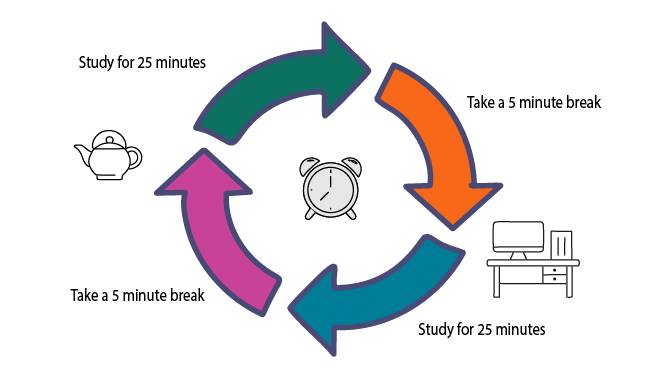Managing your workload
Making a plan for your trimester and creating a weekly study schedule is an important first step to managing your study workload.
It’s important to prioritise time for yourself, for your work and for your study. It’s about finding out what you are comfortable with and prioritising the things that matter most to you.
Moulishri Shukla, Deakin Writing Mentor
Find a study time and routine that works for you
- Which time of day do you usually study best? Morning, afternoon or evening?
- Consider whether you study more efficiently for shorter or longer periods of time.
- Take active breaks in between study sessions.
- Try setting reminders to complete tasks.
- Set up CloudDeakin notifications to be sent to your email to receive important updates.
Set clear, achievable goals
- For each day, make a list of short achievable tasks for the study time you have.
- Do you have clear and specific goals? e.g. read Week 2 articles and make notes for Assessment Task 1. e.g. review Week 5 lecture recording.
- Make a short checklist of tasks and check off completed items. Reward yourself when the task has been completed – it could be a coffee, a snack, or getting in touch with a friend. It feels good, doesn’t it?
- Are your weekly/daily goals visible on: A notepad on your desk? Post-it notes on your laptop? App reminders?
Prioritise your tasks
You can prioritise tasks in different ways:
- How urgent is it? Is there a deadline looming?
- How long will it take me to complete it? Is it a lengthy assessment?
- How important is it? What is the weighting of this assessment for my final grade?
- How will it benefit me to complete it earlier? Is there a reason I have been avoiding it? Will doing it now allow me to better focus on other tasks?
Discover your ideal study environment(s)
- Find a study place that is comfortable and without too many distractions, e.g. at home, the Library, a campus learning space.
- There are studies that show that regularly changing study location can improve retention (Bjork & Bjork, 2009).
- Some students prefer quiet and solitude. Others prefer to be around other students, anonymously or in a study group. Find out how you study best.
- Is your phone distracting you? Try turning it off for short periods of study. Or read some articles offline or in print.
- Don’t forget to stay connected to your learning environment and community by attending live classes, posting to unit site discussion forums, and making time to meet your classmates and discuss coursework. Peer learning is a really effective study strategy!
Reflect on how you study most effectively
How, when and where you study best will be unique to your preferences and circumstances. Finding the best way to manage your work can take some experimenting to get it right.
Consider these questions:
- What worked best last trimester? What do I want to keep doing / stop doing / start doing?
- Do I have good time management strategies in place?
- Have I considered some alternative strategies for planning and preparing to complete tasks?
- Have I achieved my unit learning outcomes? What could I learn from my assessment feedback?
- What are my long-term personal goals in completing this course? How might this impact on the way I approach my studies?
Bjork E. L. & Bjork, R. (2009). Making things hard on yourself, but in a good way: Creating desirable difficulties to enhance learning. Bjork Learning and Forgetting Lab, UCLA. https://bjorklab.psych.ucla.edu/wp-content/uploads/sites/13/2016/04/EBjork_RBjork_2011.pdf
In summary
- Experiment and find a study routine that works best for your needs.
- Learn how to set task goals, prioritise and be flexible where necessary.
- Reflect on how, where and when your study most effectively.


